10 Most Sustainable Vegan Shoe Brands: The Conscious Consumer’s Guide
Affiliate Disclosure
Hey fellow impactful ninja ?
You may have noticed that Impactful Ninja is all about providing helpful information to make a positive impact on the world and society. And that we love to link back to where we found all the information for each of our posts.
Most of these links are informational-based for you to check out their primary sources with one click.
But some of these links are so-called "affiliate links" to products that we recommend.
Why do we add these product links?
First and foremost, because we believe that they add value to you. For example, when we wrote a post about the environmental impact of long showers, we came across an EPA recommendation to use WaterSense showerheads. So we linked to where you can find them. Or, for many of our posts, we also link to our favorite books on that topic so that you can get a much more holistic overview than one single blog post could provide.
And when there is an affiliate program for these products, we sign up for it. For example, as Amazon Associates, we earn from qualifying purchases.
What do these affiliate links mean for you?
First, and most importantly, we still only recommend products that we believe add value for you.
When you buy something through one of our affiliate links, we may earn a small commission - but at no additional costs to you.
And when you buy something through a link that is not an affiliate link, we won’t receive any commission but we’ll still be happy to have helped you.
What do these affiliate links mean for us?
When we find products that we believe add value to you and the seller has an affiliate program, we sign up for it.
When you buy something through one of our affiliate links, we may earn a small commission (at no extra costs to you).
And at this point in time, all money is reinvested in sharing the most helpful content with you. This includes all operating costs for running this site and the content creation itself.
What does this mean for me personally?
You may have noticed by the way Impactful Ninja is operated that money is not the driving factor behind it. It is a passion project of mine and I love to share helpful information with you to make a positive impact on the world and society. However, it's a project in that I invest a lot of time and also quite some money.
Eventually, my dream is to one day turn this passion project into my full-time job and provide even more helpful information. But that's still a long time to go.
Stay impactful,
Amid growing concerns about the textile industry’s environmental impact and cruelty toward animals, many clothing brands are moving away from animal-derived materials and into vegan alternatives. However, fashion greenwashing makes it harder for you and all other consumers to determine which brands offer the most eco-friendly vegan shoes. So, we had to ask: Which are the most sustainable vegan shoe brands?
The most sustainable vegan shoe brands are VEERAH, Sylven New York, and MoEa, which cut down on their carbon footprints, minimize waste, and strive for circularity. In addition, Etiko and Collective Canvas use natural or low-impact innovative materials while adhering to ethical practices.
If you are searching for a pair of vegan shoes to add to your wardrobe without negatively impacting the soil, the water, the animals, and other people, there is a brand for you. So, let’s keep reading to learn more about the most sustainable vegan shoe brands and how they ensure sustainable, ethical practices.
Here’s How We Selected the 10 Most Sustainable Vegan Shoe Brands
The fast fashion industry has pushed for shoes to be trend-dependent and easily replaceable. Yet, the environmental impacts of making and landfilling vegan sneakers can be enormous, especially with synthetic materials.
“Sustainable: The ability to be maintained at a certain rate or level | Avoidance of the depletion of natural resources in order to maintain an ecological balance”
Oxford Dictionary
The brands on this list were chosen based on their commitment and actions to promote sustainable practices while reducing the environmental impacts of the textile industry.
They are transparent about their materials, processes, and workforce management within their supply chain.
Some brands focus their efforts on reducing waste and optimizing natural resources while others strive to reduce the carbon footprint of their clothes.
All of these brands share the commitment to reshape the textile industry toward a more sustainable and Earth-friendly sector.
These Are the 10 Most Sustainable Vegan Shoe Brands
Most Sustainable Vegan Shoe Brands
Overall, these vegan shoe brands are sustainable. Yet, they take various approaches to reduce environmental impacts and uphold ethical standards. Let’s dive into each brand and find out more.
VEERAH: Shoes and Accessories Made Ethically With Vegan Leather
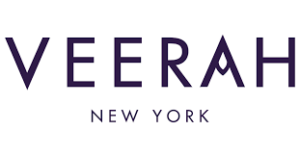
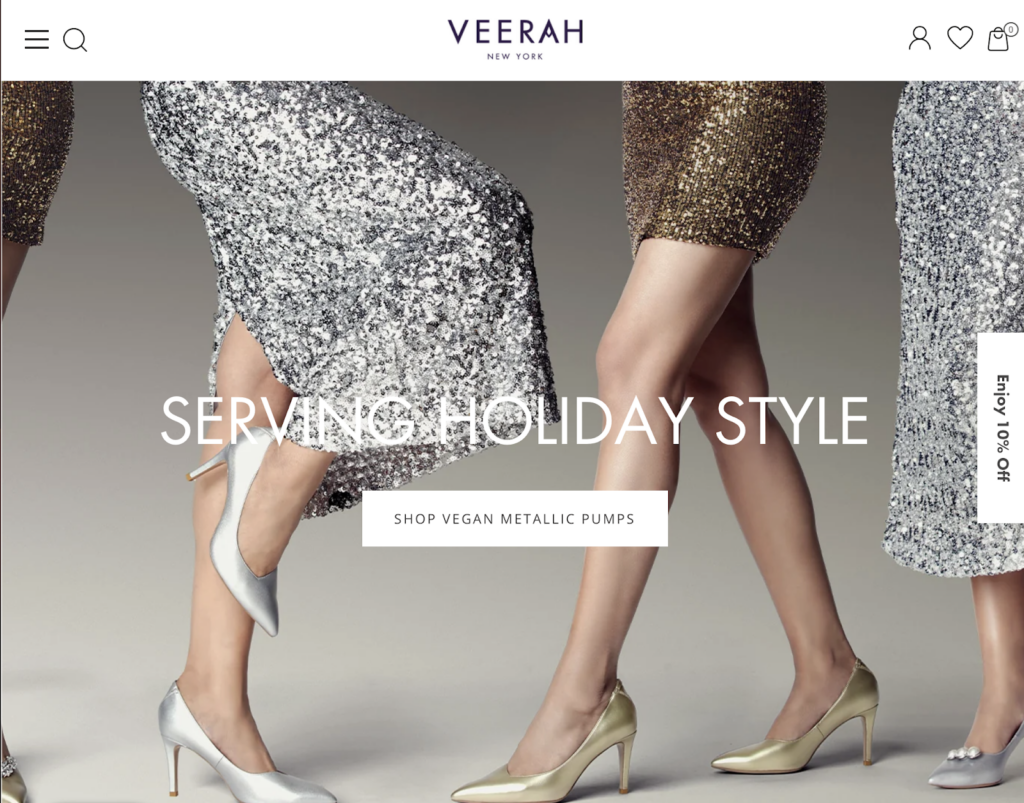
“With smart sourcing and thoughtful design behind each collection, all of our shoes are ethically made using only vegan, innovative materials – from apple leather to recycled plastic textile and more.”
VEERAH
🌎
How do they ensure their sustainability?
VEERAH’s sustainability efforts focus on sourcing low-impact, recycled, and recyclable materials, reducing waste, and making lasting shoes. For their shoes, VEERAH opts for vegan leather instead of animal leather to avoid the adverse environmental impacts associated with sourcing and processing animal hides. Instead of animal-derived leather, the brand uses vegan leather made with apple peel or bamboo, reducing their greenhouse gas emissions. For their packaging, VEERAH strives to have 100% recyclable packaging. Currently, 85% of their packaging materials are made from post-consumer materials, and 71% are recyclable. Their shoe boxes are made from 80% post-consumer chipboard, and all communication collaterals are printed on post-consumer paper. Regarding waste, VEERAH has reduction initiatives, including limited production runs and used shipping boxes that customers can select during the check-out process. Lastly, they handcraft their shoes to last for a long time, prioritizing quality over quantity.
🌐
How do they ensure their ethics?
VEERAH has a Code of Conduct that covers four of the ILO’s Fundamental Principles and Rights at Work. They also ensure most workers in the final production stage are paid a living wage and trace part of their supply chain, including all of the final production stage.
🤝
Are they part of any giving-back programs?
VEERAH pledges to give back to communities, supporting causes aligned with their values. Specifically, they donate at least 1% of their revenue to social impact causes. Additionally, their employees are offered ten paid hours per quarter for volunteering or taking self-improvement courses. For every 100 customer feedback surveys they receive, VEERAH sponsors a one-year scholarship for a “She’s the First” girl scholar.
🛍️
What is their product range?
- Best for: womenswear
- Product range: boots, flats, heels, sandals, accessories
- Price range: $$$
- Size range: XS–XXL
Sylven New York: Plant-Based and Vegan Luxury Footwear
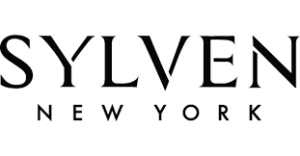
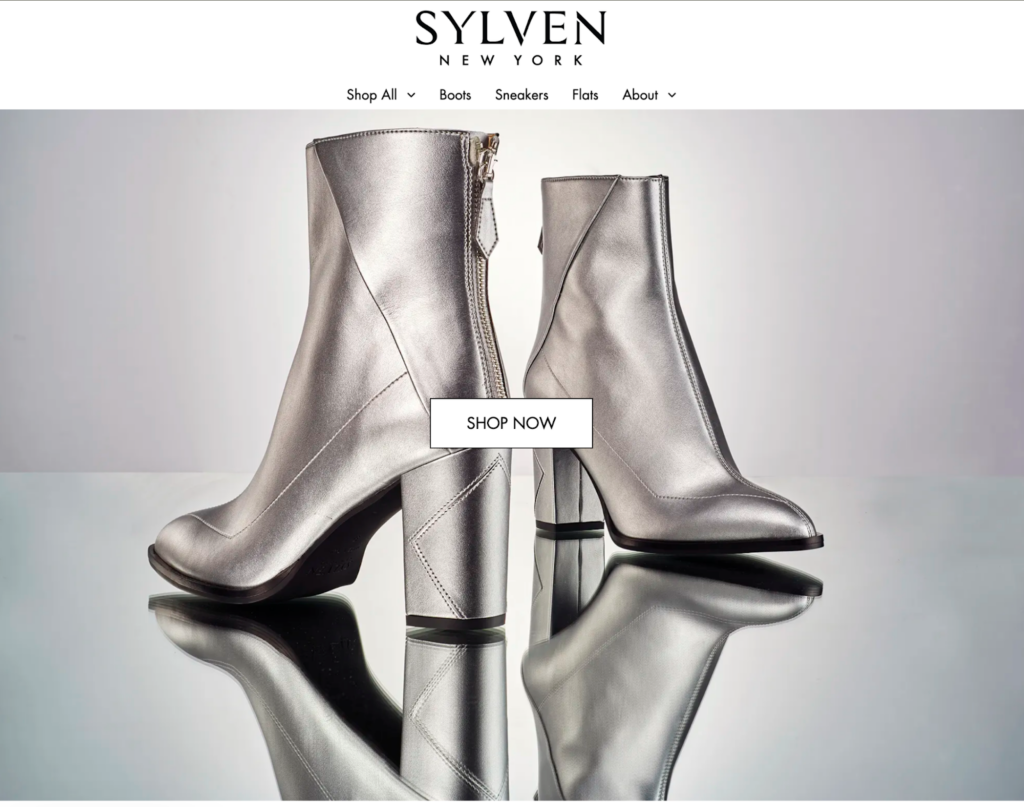
“Intentionally designed with reverence for our planet and all its inhabitants.”
Sylven New York
🌎
How do they ensure their sustainability?
Sylven New York promotes sustainability by innovating with shoe materials to reduce the sourcing environmental impacts, recycling most of their process’s unusable parts, and keeping sourcing and manufacturing at close distances within Italy to reduce the transportation carbon footprint. Firstly, they prioritize plant-based, bio-based, renewable, recycled, and organic vegan materials and components. Specifically, they use AppleSkinTM—a bio-based vegan leather—instead of animal skin for the shoe’s upper while sourcing coconut husk for insoles and wheat and barley byproducts for the lining. Additionally, Sylven New York uses various recycled materials, such as Vegan Nappa, recycled soles from closed-loop recycled rubber, recycled heels from closed-loop recycled plastic, and recycled shoe lasts. Regarding packaging, their shoes are shipped with recycled paper, reclaimed cotton dust bags, and recycled and recyclable shoe boxes. They also employ a plastic-free packaging mandate with all of their factory partners. Secondly, beyond using recycled materials, the brand also gives the unusable parts of their products another life via their partnership with TerraCycle. Lastly, they source materials and produce shoes within Italy, keeping the transportation distances relatively short and the associated carbon emissions relatively low.
🌐
How do they ensure their ethics?
Sylven New York partners with factories based in Italy, a medium-risk country for labor abuse. They also visit each of their facilities.
🤝
Are they part of any giving-back programs?
Sylven New York is not known to be part of any giving-back programs.
🛍️
What is their product range?
- Best for: womenswear
- Product range: boots, sneakers, flats
- Price range: $$$
- Size range: XS–XL
MoEa: Bio-Sneakers Made From Fruits and Plants
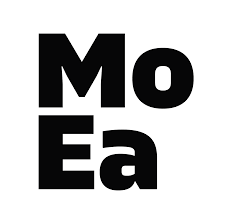
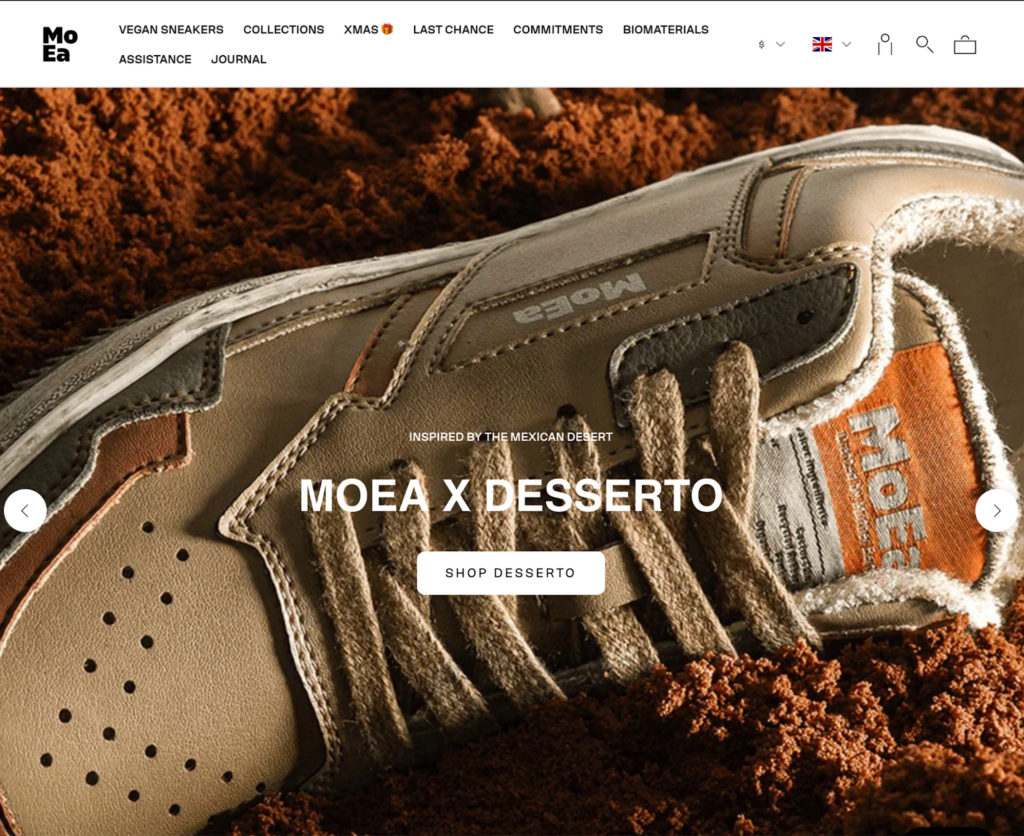
“We’ve launched MoEa to create sneakers that offer the same level of style and comfort you’d expect to see in your favourite leather pair, whilst ensuring that the planet isn’t some sort of a meaningless afterthought and that animals aren’t treated with cruelty.”
MoEa
🌎
How do they ensure their sustainability?
MoEa ensures sustainability by replacing leather with biomaterials to stay cruelty-free while reducing their carbon footprint. Their biomaterials of choice are made with agricultural waste and a stabilizer of either cotton or recycled/bio-based polyurethane. MoEa also uses a range of bio-based vegan leathers, including Piñatex, AppleSkinTM, CactusSkin, CornSkin, and GrapeSkin. Beyond shoe uppers, the brand sources recycled materials for other parts, for example, 70% recycled bamboo for the lining and 40% recycled rubber for the soles. Additionally, they calculate and disclose the life-cycle carbon footprint of each type of biomaterial used in their sneakers. Their life-cycle assessment, made by certified agency Sami, shows that a MoEa sneaker emits on average 5kg CO2 eq. In comparison, the estimated carbon impact of a pair of bovine leather shoes is over 60 kg CO2 eq.
🌐
How do they ensure their ethics?
MoEa ensures their ethics by using traceable materials and holding the last stage of production in Portugal, a low/medium risk country for labor abuse. They also visit their suppliers. Regarding animal welfare, they avoid animal cruelty practices by making their entire product range vegan, certified by PETA.
🤝
Are they part of any giving-back programs?
MoEa is a member of 1% for the Planet, donating one percent of their sales to environmental causes. They also help protect forests with WWF France.
🛍️
What is their product range?
- Best for: unisex
- Product range: sneakers, socks
- Size range: XXS–XXL
Etiko: Vegan Feel-Good Footwear


“By creating fair, transparent, environmentally-friendly supply chains, Etiko has directly supported the human rights and labour conditions of countless cotton growers, rubber tappers, apparel workers, shoe manufacturers and sports ball producers living in India, Sri Lanka and Pakistan”
Etiko
🌎
How do they ensure their sustainability?
Etiko ensures sustainability by sourcing low-impact materials, minimizing waste, and reducing their climate impact. Firstly, they use a high proportion of certified natural materials for their footwear and clothing. Specifically, their sneakers are constructed with a Fairtrade– and GOTS-certified organic cotton upper and FSC-certified natural rubber latex soles. They are also colored with low-impact reactive dyes. Furthermore, their entire footwear selection is vegan and cruelty-free. On that note, they use no animals or animal-based glue. Regarding their packaging, the brand opts for the most eco-friendly options available, specifically FSC-certified cardboard and paper, biodegradable and compostable plastic, and recyclable mail bags. Secondly, Etiko minimizes waste by reusing some of their textile offcuts and recycling worn-out Etiko footwear and apparel at their partners’ facilities. Thirdly, the brand strives to reduce their climate impact by measuring their carbon footprint and offsetting emissions. And finally, their carbon credits with Carbon Social support subsistence farmers in Baguia by replanting trees, improving livelihoods, and building village economies.
🌐
How do they ensure their ethics?
Etiko ensures their ethics by adhering to the standards set by Fairtrade. These include a warranty against falling prices to enable farmers and workers to plan for their future, a fixed additional amount of money paid to producers—which they can invest into their community or business—and the protection of worker rights. Furthermore, their Code of Conduct covers four of the ILO’s Fundamental Principles and Rights at Work. And on top of that, they trace most of their supply chain down to cotton farms.
🤝
Are they part of any giving-back programs?
Etiko produces shoes that help fund the important work of charities. For example, they raised $5,049 for Sea Shepherd, Save the Children, Animal Australia, Injalak Arts, and Free the Bears through the Etiko’s Thongs for Good campaign in 2020. Also, in 2021, the brand released the Refujesus T-shirt, which directly supports the Asylum Seeker Resource Centre by donating $10 of each sale to ASRC.
🛍️
What is their product range?
- Best for: womenswear, menswear, kidswear
- Product range: sneakers, ballet flats, T-shirts, polo shirts, crewnecks, hoodies, underwear, singlets, socks, accessories
- Price range: $$
- Size range: XS–3XL
Collective Canvas: Canvas Sneakers Made With Natural, Low-Impact Materials

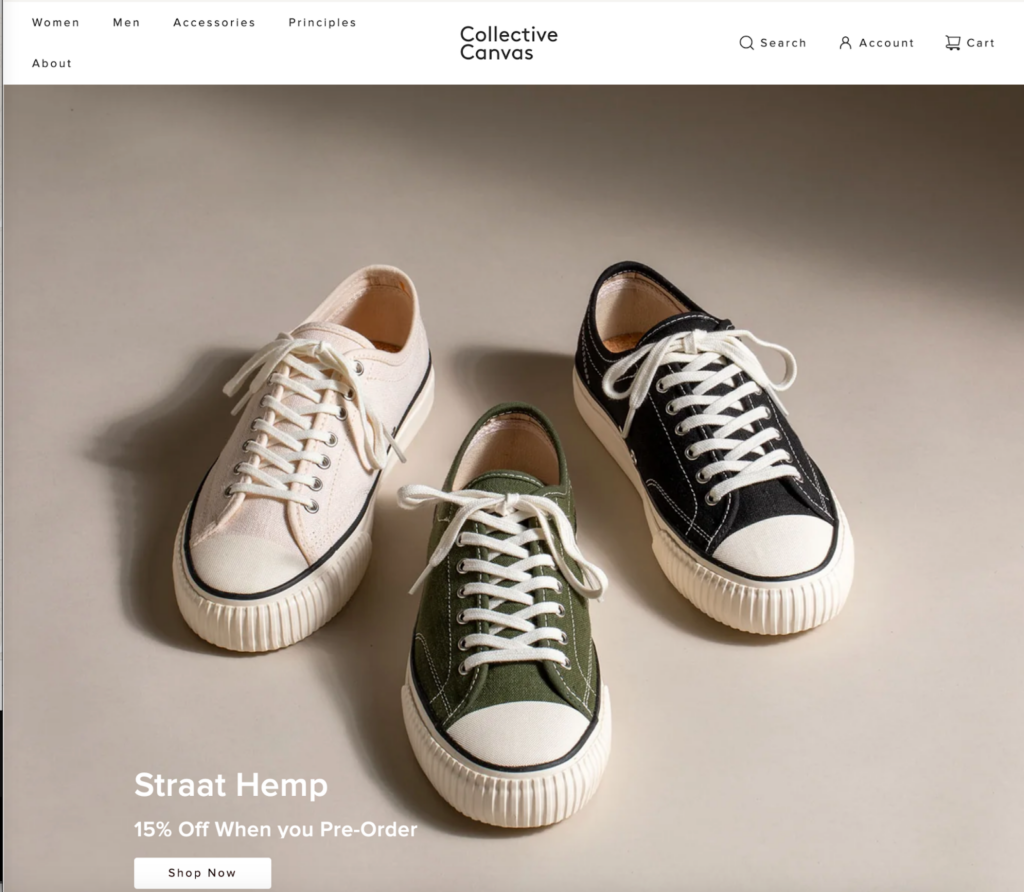
“Our intention is that through the responsible use of natural materials, the bulk of our shoes are biodegradable at the end of their life.”
Collective
🌎
How do they ensure their sustainability?
Collective Canvas ensures sustainability by sourcing natural materials for shoes and shoe boxes. 97% of the composition of their footwear products comes from nature, including organic hemp, organic cotton, natural latex rubber, and renewable castor oil. For example, the upper of their Straat Hemp Black/White sneakers are made from organic hemp canvas, with the lining made from a blend of hemp and organic cotton, and an insole made with renewable caster oil and naturally sustainable cork veneer. On top of that, their laces made with organic cotton. Regarding packaging, their shoe boxes and courier bags are made from 100% post-consumer paper waste and printed from plant-based inks. Furthermore, Collective Canvas has a Takeback & Recycling Scheme, offering customers a responsible way of recycling used sneakers. Specifically, the organic cotton canvas uppers and laces are recycled in Little Yellow Bird’s Circular Cotton initiative to create new yarns for textile production. On the other hand, the natural rubber soles and upper reinforcements are ground into rubber crumbs and then repurposed into roading asphalt, equestrian arenas, and artificial sports turf. Similarly, the insoles and eyelets are given new life rather than sent to landfills.
🌐
How do they ensure their ethics?
Collective Canvas is transparent about where their products are made. All workers are paid a living wage, which includes health insurance and pension contributions. The workers are also provided daily meals, on-site lodging, as well as the option of free English classes. On top of that, they visit their manufacturer in China several times a year. Collective Canvas is also transparent about their prices, broken down by the core components of their footwear products.
🤝
Are they part of any giving-back programs?
Collective Canvas sells all of their b-stock or less-than-perfect pairs as Imperfects and gives 100% of the proceeds to the Mental Health Foundation of New Zealand.
🛍️
What is their product range?
- Best for: menswear, womenswear
- Product range: sneakers, accessories
- Price range: $$$
- Size range: XS–XL
Okabashi: Vegan Shoes Made Sustainably in the US


“We make the most comfortable shoes on the principles of foot wellness and reflexology. ”
Okabashi
🌎
How do they ensure their sustainability?
Okabashi ensures their sustainability by striving for circularity while reducing their carbon footprint. Firstly, they operate a closed-loop system that recycles used shoes and scraps from production and mixes the grounding with a bio-based material to create new shoes, which are vegan, cruelty-free, and 100% recyclable. On average, Okabashi shoes contain 25% recycled material. Secondly, their shoes contain approximately 40% US-grown soy and are made locally in the US, lowering the transporting carbon footprint. Their shoes also travel 93% less than the average imported shoes, which results in a significant carbon footprint reduction.
🌐
How do they ensure their ethics?
Okabashi traces most of their supply chain and visits their suppliers regularly. Their factory is located in the US, a medium-risk country for labor abuse.
🤝
Are they part of any giving-back programs?
Okabashi partners with Soles4Souls to provide communities with shoes. For over 10 years now, they have donated over 8,000 pairs of shoes. The brand also provides disaster relief and helps fight poverty by donating shoes and clothing.
🛍️
What is their product range?
- Best for: womenswear, menswear, kidswear
- Product range: sandals, ballet flats, T-shirts
- Price range: $$$$
- Size range: XS–3XL
Ethletic: Traceable Sneakers Made With Natural and Recycled Materials
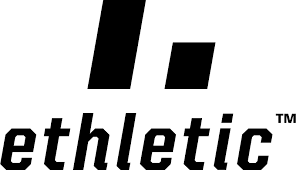
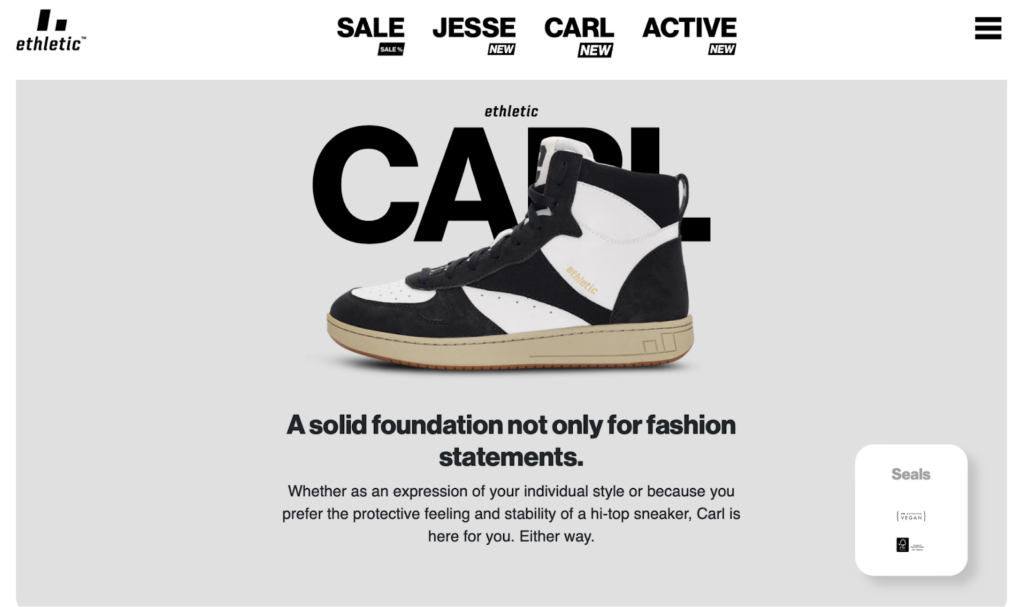
“The people who work for Ethletic aren’t numbers on a balance sheet or a cost factor for us. We know these people. We appreciate them and their skills, their commitment, their history.”
Ethletic
🌎
How do they ensure their sustainability?
Ethletic promotes sustainability by using a high proportion of eco-friendly materials. Specifically, for their signature shoes, they source canvas based on Fairtrade organic cotton for the uppers and FSC-certified rubber for the soles. Additionally, Ethletic uses GRS-certified recycled PU leather in some models to achieve high comfort and guaranteed perfect fit. Further down the life-cycle in the manufacturing stage, Ethletic shoes are built in a way that allows future separation and recycling, a first step toward going circular. Regarding transportation, Ethletic commits to “no air shipment,” transporting all their sneakers exclusively by ships. Since 2019, they have offered their customers a discounted repair option in collaboration with Berlin-based start-up Sneaker Rescue, helping to extend the lifespan of the sneakers and reduce pressure on the environment.
🌐
How do they ensure their ethics?
As their name might suggest, ethics is at the center of Ethletic’s operation. Their manufacturing partner is Fairtrade-certified and has a premium-funded worker society, ensuring the workers’ fair working conditions and treatment. Specifically, for each pair of shoes sold, one US dollar is paid as a premium to the Talon Fair Trade Workers Welfare Society. A democratically elected group then decides which health care and educational projects to use this money for. Ethletic also traces the whole supply chain and audits most of their suppliers. They disclose the workers who make their products and enable visitors to tip these workers directly on their website. Additionally, Ethletic commits to product traceability, including the total distance traveled from fabric to brand, as well as the material composition.
🤝
Are they part of any giving-back programs?
Ethletic is not known to be part of any giving-back programs.
🛍️
What is their product range?
- Best for: menswear, womenswear
- Product range: sneakers
- Price range: $$
- Size range: XS–XL
Good Guys: Vegan and Cruelty-Free Shoes Made in Europe
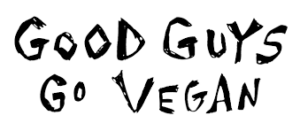
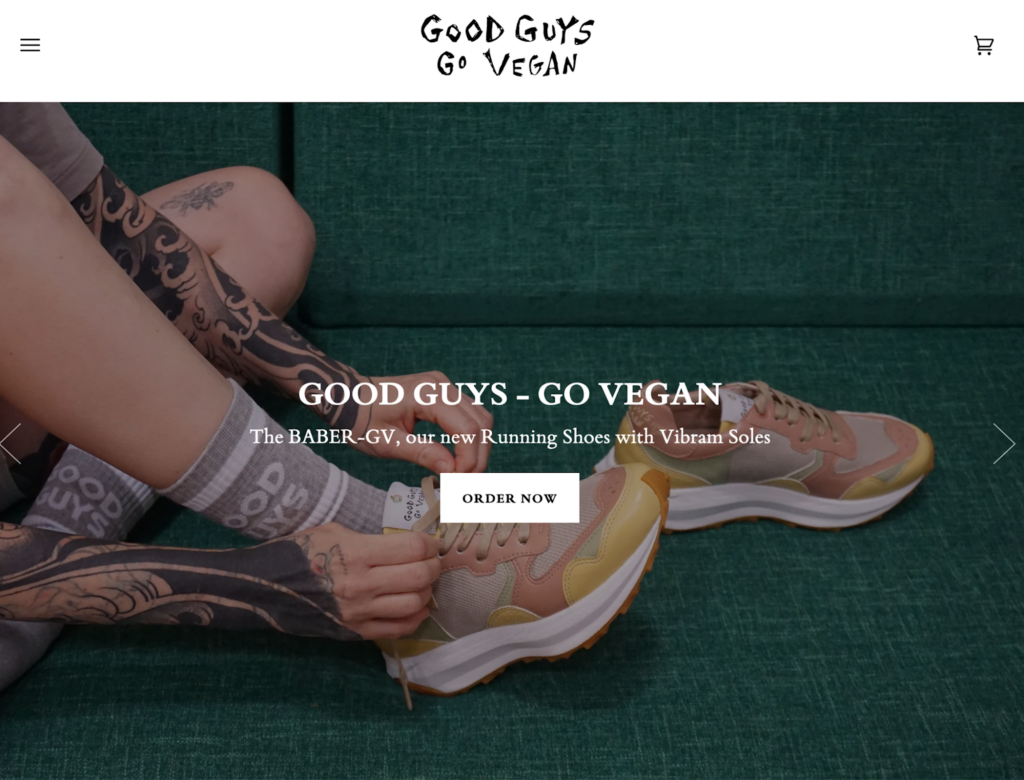
“We carefully choose our collaborators and make sure all our productions are made in a fair-trade environment and are 100% Vegan, from the glue to all the components we use for our shoes.”
Good Guys
🌎
How do they ensure their sustainability?
Good Guys prioritizes sustainability by replacing high-impact animal-derived materials with vegan alternatives. They opt for AppleSkinTM and REACH-certified PU-based microfibers instead of leather and suede for the shoe upper, avoiding the chemicals and the cruelty associated with sourcing and processing animal products. For the lining of their shoes, Good Guys uses bio-based, recycled, recyclable microfiber approved by OEKO-TEX® STANDARD 100. Additionally, they source natural materials for soles and glue elements. Additionally, they keep sourcing and manufacturing within relatively close distances (within the regions of Italy, Spain, and Portugal), lowering their transport carbon footprint. Lastly, they strive to extend the lifespan of their shoes with a care guide and an incentive to recycle pre-loved Good Guys products.
🌐
How do they ensure their ethics?
Good Guys is transparent about the final production stage of their products, sharing their Europe-based manufacturing partners and the specific footwear made in each facility. Manufacturing in the European Union, a low/medium risk region for labor abuse, makes it easier to guarantee a fair-trade environment. Good Guys also visits their suppliers. Regarding animal welfare, they avoid animal cruelty practices by making their entire product range vegan.
🤝
Are they part of any giving-back programs?
Good Guys is not known to be part of any giving-back programs.
🛍️
What is their product range?
- Best for: womenswear, menswear
- Product range: sneakers, boots, clogs, sandals, socks
- Price range: $$$
- Size range: XS–XXL
Flamingos’ Life: Vegan Sneakers Handmade With Natural and Recycled Materials


“We use our company to provide a solution to the ecological crisis in which we find ourselves. Veganism is a vehicle for change, it is the key to reducing greenhouse gas emissions and our water footprint. ”
Flamingos’ Life
🌎
How do they ensure their sustainability?
Flamingos’ Life ensures sustainability by sourcing low-impact textiles for their sneakers and recycled materials for their packaging. Specifically, they have developed their own sneaker materials from plant materials, such as corn waste, virgin bamboo and cotton grown without pesticide, and natural rubber extracted sustainably. Using biodegradable materials (corn and bamboo) in their sneakers helps reduce carbon emissions and toxicity. Additionally, Flamingos’ Life opts for recycled polyester made with post-consumer plastic to help reduce plastic waste, especially in marine environments. Flamingos’ Life also uses recycled packaging.
🌐
How do they ensure their ethics?
Flamingos’ Life ensures their ethics by striving for full transparency and making the entire supply chain more democratic. They have partnered with the sustainable fashion consulting company BCOME to conduct a deep analysis of their production processes (raw materials, working conditions, corporate traceability, product cycle, and waste, among other aspects), as well as their environmental footprint. The study confirmed that around 100 people contribute to creating one of their sneaker designs and all work in safe and ethical working conditions. Flamingos’ Life traces most of their supply chain and holds the final stage of production in Spain, a medium-risk country for labor abuse.
🤝
Are they part of any giving-back programs?
Flamingos’ Life gives back by associating each of their sneaker collections with a social project, aiming to balance their impact and improve the lives of the most vulnerable. For example, every sale in the Classic 70s collection help plant 5 trees. Flamingos’ Life works with Agua ONG to build water wells in underserved areas of Uganda and Eden Reforestation Projects to plant trees in Madagascar and Mozambique. They also make monthly monetary donations to Waste Free Oceans for marine litter collection.
🛍️
What is their product range?
- Best for: womenswear, menswear
- Product range: sneakers
- Price range: $$
- Size range: XS–XL
NAE Vegan Shoes: Shoes Made Sustainably With “No Animal Exploitation” (NAE)
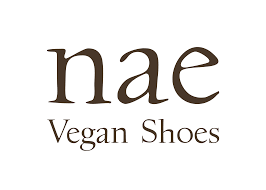
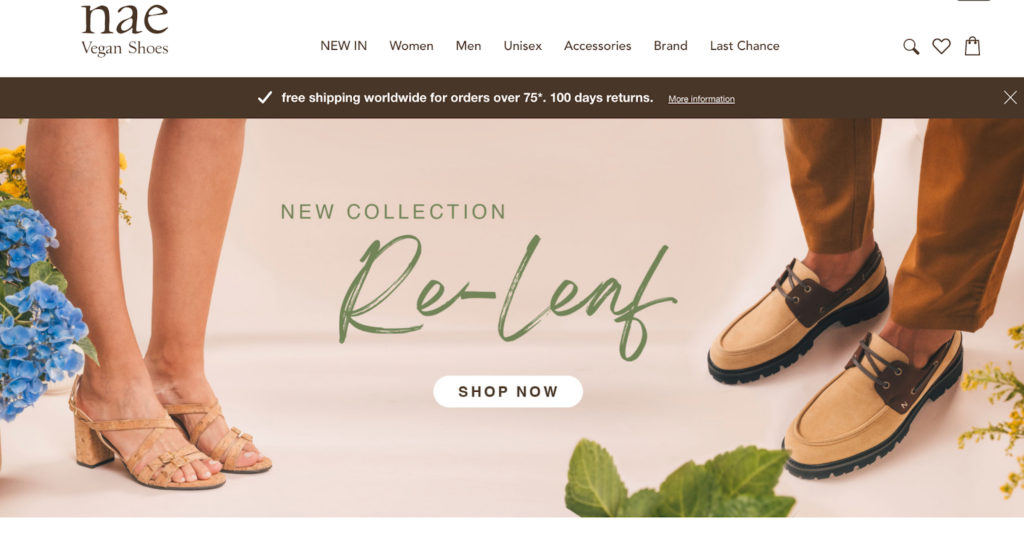
“We carefully select the best material options that meet our environmental ideals, without compromising the quality and durability of our vegan shoes.”
NAE Vegan Shoes
🌎
How do they ensure their sustainability?
NAE Vegan Shoes ensures sustainability by sourcing durable materials according to environmental parameters such as resources and waste, energy usage and carbon emissions, chemical use, and pollution. Consequently, they don’t use animal leather for their shoes, but rather Piñatex and AppleSkinTM vegan leather alternatives. NAE Vegan Shoes also sources low-impact materials like organic cotton, cork, and recycled polyester for their footwear products. Additionally, every element of their packaging is 100% recyclable. NAE Vegan Shoes also uses recycled cardboard boxes, recycled kraft wrapping paper, and eco-friendly tape made from kraft paper and natural rubber adhesive.
🌐
How do they ensure their ethics?
NAE Vegan Shoes traces most of their supply chain. Their final production stage is undertaken in Spain and Portugal, medium-risk countries for labor abuse. Regarding animal welfare, they avoid animal cruelty practices by making their entire product range vegan.
🤝
Are they part of any giving-back programs?
NAE Vegan Shoes is not known to be part of any giving-back programs.
🛍️
What is their product range?
- Best for: menswear, womenswear
- Product range: boots, sneakers, flat shoes, heels, sandals, accessories
- Price range: $$$
- Size range: XS–XXL
Why Is It Important to Buy Products Made of More Sustainable Fabrics
It is important to buy products made of more sustainable fabrics because a sustainable textile industry has a lower carbon footprint, helps save natural resources, and is better for forests, animals, and humans.
Buying Sustainable Fabrics Reduces Your Carbon Footprint
The production of clothing and footwear is estimated to contribute 10% of global greenhouse gas emissions—more than all international flights and shipping combined. If the fashion industry were a country, it would be the fourth largest emitter of carbon dioxide.
One way to reduce the carbon footprint of the clothes you buy is to opt for sustainable fabrics. Sustainable fabrics, which are often made with natural or recycled fibers, have relatively low carbon footprints compared to petroleum-based fabrics. For example, organic cotton made in the US has a carbon footprint of 2.35 kg CO2 (per ton of spun fiber)—a quarter of polyester’s carbon footprint.
Buying Sustainable Fabrics Reduces Demand for Natural Resources and Waste Management
The textile industry uses water and land to grow vegan leather and other fibers. It is estimated that 79 billion cubic meters of water were used for the sector worldwide in 2015. For example, producing a single cotton T-shirt requires as much water as one person drinks for 2.5 years (2,700 liters of fresh water).
Worse yet, the textile economy is vastly more linear than circular: the largest amount of resources used in clothes ended up in landfills (instead of being recycled to remake clothes). According to a report by the Ellen MacArthur Foundation,
- Less than 3% of materials used in the textile economy in 2015 came from recycled sources.
- In other words, more than 97% of resources used in making clothes are newly extracted.
When clothing items are disposed of within a short period of time—under a year in the case of half of the fast fashion clothes—the natural systems that provide raw materials for fabrics don’t have enough time to recover and regenerate, which could lead to ecological breakdown.
Sustainable fabrics are made with less water and emissions while lasting longer:
- Because they are durable, you don’t need to buy new clothes too often.
- Thus, you help reduce the pressure to extract more resources for making new items.
Similarly, making and consuming sustainable fabrics made with recycled materials reduces the demand for virgin materials while helping tackle waste management.
Buying Sustainable Fabrics Encourages Sustainable Management of Forests
Sustainable plant-based fabrics are made with raw materials from forests and plantations that are sustainably managed, such as complying with FSC standards.
When you buy sustainable plant-based fabrics, you discourage unsustainable forestry practices like illegal logging. You also help reduce deforestation, biodiversity loss, and the effects of climate change.
Buying Sustainable Fabrics Encourages Fairer Treatment of Animals
The fashion industry is rife with animal mistreatment when it comes to making animal-based fabrics like vegan leather or vegan leather. Every year, billions of animals suffer and die for clothing and accessories.
Buying sustainable vegan alternatives can help to reduce the pressure on raising more and more animals to meet the demand for animal-based fabrics while sacrificing their well-being and lives.
Suppose you have to buy fabrics made with, for example, vegan leather or vegan leather; make sure you only choose brands committed to cruelty-free products. In that case, you help advocate better treatments for animals raised within the textile industry.
Using Sustainable Fabrics Encourages Fairer Treatment of Textile Workers
Recent statistics from UNICEF estimated as many as 170 million child laborers worldwide, many of whom were engaged in some form of work in the textile industry. They don’t get paid minimum wages and often work long hours.
When you buy sustainable fabrics from brands transparent about the working conditions at their factories, you discourage the use of child labor and help promote better working conditions for textile workers.
How Can You Generally Buy More Sustainable Fabrics
The key to sustainably buying fabrics is to check on relevant environmental and original certifications.
For natural fabrics:
- Global Organic Textile Standard (GOTS): A globally recognized certification system that ensures a certain threshold of organic content has been met. It covers manufacturing, packaging, labeling, transportation, and distribution (but not what happens in the fields where crops are grown).
- USDA Certified Biobased Product: The USDA BioPreferred® Certification is a voluntary certification offered by the United States Department of Agriculture. The certification identifies products made from plants or other renewable materials.
- Ecolabel: Ecolabel is the official European Union voluntary label recognized worldwide for certified products with a guaranteed, independently verified low environmental impact. The label requires high environmental standards throughout the entire life-cycle: from raw material extraction through production and distribution to disposal. It also encourages companies to develop innovative, durable, easy-to-repair, and recyclable products.
For plant-based semi-natural/semi-synthetic fabrics:
- Forest Stewardship Council: An FSC certification ensures that the vegan leather (or vegan leather-like material) comes from responsibly managed forests that provide environmental, social, and economic benefits.
There are two types of FSC Certification:- FSC Forest Management Certification, with a focus on the origin of the wood—the forest.
- FSC Chain of Custody Certification, which focuses on the path from the forest to the customer’s home.
- Program for Endorsement of Forest Certification: PEFC’s approaches to sustainable forest management are in line with protecting the forests globally and locally and making the certificate work for everyone. Getting a PEFC certification is strict enough to ensure the sustainable management of a forest is socially just, ecologically sound, and economically viable but attainable not only by big but small forest owners.
For recycled fabrics:
- Recycled Claim Standard (RCS): The Textile Exchange RCS was originally developed as an international, voluntary standard that sets requirements for third-party certification of recycled input and chain of custody.
- The Global Recycled Standard (GRS): The Global Recycled Standard (GRS) is an international, voluntary, full product standard that sets requirements for third-party certification of Recycled Content, chain of custody, social and environmental practices, and chemical restrictions. It can be used for any product with more than 20% recycled material.
For all types of fabrics:
- STeP by OEKO-TEX®: STeP by OEKO-TEX® is an independent certification system for brands, retailers, and manufacturers from the textile and leather industry. It communicates organizational environmental measures, including reducing carbon footprint and water usage.
- OEKO-TEX® Standard 100: OEKO-TEX® labels aim to ensure that products pose no risk to human health (i.e., containing banned chemicals).
Some certifications that are signaling brands’ efforts toward lowered environmental impacts and a circular economy are:
- B Corp Certification: The label B Corp is a certification reserved for for-profit companies. Certified holders are assessed on their social and environmental impacts.
- Cradle2Cradle certification: Cradle2Cradle provides a standardized approach to material circularity. It assesses whether products have been suitably designed and made with the circular economy in mind covering five critical categories: material health, material reuse, renewable energy and carbon management, water stewardship, and social fairness.
Final Thoughts
Despite their cruelty-free nature, vegan shoes are at risk of becoming a trendy fashion symbol that can have severe adverse environmental impacts because of the challenges in recycling them, as well as their conventional use of high-impact materials. Thus, it is important to shop with ethics and sustainability in mind when choosing your next pair.
By purchasing new or preloved vegan shoes from brands that commit to sustainability, you support their mission to create a fairer and less harmful textile industry for all lives on Earth.
Here is the list (again) of the most sustainable vegan shoe brands:
- VEERAH
- Sylven New York
- MoEa
- Etiko
- Collective Canvas
- Okabashi
- Ethletic
- Good Guys
- Flamingos’ Life
- NAE Vegan Shoes
To make your use of these shoes even more sustainable, follow these steps:
- Buy second-hand, recycled, or upcycled vegan shoes.
- Maximize the number of wears between washes and keep them as long as possible.
- At the end-of-life of your vegan shoes, upcycle the materials to extend their usage and arrange for them to be recycled or properly disposed of.
Stay impactful,

Sources
- VEERAH: Home
- Womsh: Home
- Sylven New York: Home
- MoEa: Home
- Etiko: Home
- Okabashi: Home
- Collective Canvas: Home
- Ethletic: Home
- Good Guys: Home
- Flamingos’ Life: Home
- VEERAH: SUSTAINABLE VEGAN MATERIALS
- VEERAH: Craftsmanship
- VEERAH: Why We Need To Rethink Leather in Fashion
- Impactful Ninja: How Sustainable Are Vegan Leather? A Life-Cycle Analysis
- VEERAH: Apple Leather
- VEERAH: Code of Conduct
- Good On You: Brand Directory | VEERAH
- International Labour Organization: ILO Declaration on Fundamental Principles and Rights at Work
- VEERAH: About VEERAH
- She’s the First: Home
- Sylven New York: Materials and Components
- Sylven New York: Sustainable Practices
- Sylven New York: Our Factory Partners
- Impactful Ninja: How Sustainable Are AppleSkinTM Fabrics? A Life-Cycle Analysis
- Impactful Ninja: How Sustainable Are Vegan Leather? A Life-Cycle Analysis
- Good On You: Brand Directory | Sylven New York
- MoEa: Material Choice
- MoEa: LCA & Carbon Footprint
- Impactful Ninja: How Sustainable Are Cotton Fabrics? A Life-Cycle Analysis
- Impactful Ninja: How Sustainable Are Polyurethane (PU) Fabrics? A Life-Cycle Analysis
- Impactful Ninja: How Sustainable Are Vegan Leather? A Life-Cycle Analysis
- Impactful Ninja: How Sustainable Are Piñatex Fabrics? A Life-Cycle Analysis
- MoEa: Apple Sneakers
- MoEa: Cactus Sneakers
- MoEa: Corn Sneakers
- Vegconomist: Meet MoEa, The Company Making Sneakers From Five Types of Sustainable Vegan Leather
- MoEa: Manufacturing Standards
- MoEa: PERA certified
- PETA: Home
- 1% for the Planet: Home
- MoEa: Restoring forests with WWF France
- European Commission: Environment | REACH Regulation
- Etiko: OUR AWARDS
- B Corporation: Etiko
- Etiko: Unisex Ethical Sneakers
- Etiko: Ballet Flats
- Good On You: Brand Directory | Etiko
- Fairtrade: How Fairtrade certification works
- Global Organic Textile Standard: Home
- Impactful Ninja: How Sustainable Are Organic Cotton Fabrics? A Life-Cycle Analysis
- Forest Stewardship Council: Home
- Etiko: SUSTAINABLE IMPACT AND TRANSPARENCEY REPORT
- Etiko: TRANSPARENCY & ACCREDITATIONS
- Etiko: Take Back Program
- Etiko: Code of Conduct
- International Labour Organization: ILO Declaration on Fundamental Principles and Rights at Work
- Sea Shepherd: Home
- Save The Children: Home
- Animal Australia: Home
- Injalak Arts: Home
- Free the Bears: Home
- Asylum Seeker Resource Centre: Home
- Collective Canvas: Principles
- Impactful Ninja: How Sustainable Are Organic Hemp Fabrics? A Life-Cycle Analysis
- Impactful Ninja: How Sustainable Are Organic Cotton Fabrics? A Life-Cycle Analysis
- Impactful Ninja: How Sustainable Are Canvas Fabrics? A Life-Cycle Analysis
- Impactful Ninja: How Sustainable Are Hemp Fabrics? A Life-Cycle Analysis
- Collective Canvas: End of Life Recycling
- B Corporation: In full flight – Little Yellow Bird is changing the game from farm to factory
- Collective Canvas: Imperfects
- Fair & Good: Brands We Love | Collective Canvas
- Mental Health Foundation: Home
- Forbes: The Other 1%: One Of America’s Last Shoemakers Charts A Growth Path
- Okabashi: Our Story
- Okabashi: Our Commitment to Sustainability
- Okabashi: Our Factory
- Good On You: Brand Directory | Okabashi
- Soles4Souls: Home
- Okabashi: Philanthrophy
- Good On You: Brand Directory | Ethletic
- Impactful Ninja: How Sustainable Are Canvas Fabrics? A Life-Cycle Analysis
- Fairtrade: Home
- Forest Stewardship Council: Home
- Textile Exchange: Global Recycle Standard
- Impactful Ninja: How Sustainable Are Polyurethane (PU) Fabrics? A Life-Cycle Analysis
- Ethletic: SUSTAINABILITY
- Ethletic: Ethletic Story
- Sneaker Rescue: Home
- Fairtrade: Fairtrade Premium preview
- Ethletic: Fair For All
- Tracycle: Ethletic
- Impactful Ninja: How Sustainable Are AppleSkinTM Fabrics? A Life-Cycle Analysis
- European Commission: Chemicals | REACH Regulation
- Good Guys: Our Materials
- OEKO-TEX: OEKO-TEX® STANDARD 100
- Good On You: Brand Directory | Good Guys
- Good Guys: Cleaning your GG
- Good Guys: Good Guys x Redonner
- Good Guys: Where are my Good Guys produced?
- Good Guys: About Good Guys DON’T WEAR LEATHER
- Flamingos’ Life: Spanish plant-based shoemakers
- Good On You: Brand Directory | Flamingos’ Life
- Flamingos’ Life: MATERIALS
- Flamingos’ Life: TRANSPARENCY
- Flamingos’ Life: Classic 70s
- Flamingos’ Life: RESTORATION PROJECT
- Flamingos’ Life: WATER SUPPLY PROJECT
- Flamingos’ Life: OCEANS PROJECT
- NAE Vegan Shoes: Our Values
- Impactful Ninja: How Sustainable Are Piñatex Fabrics? A Life-Cycle Analysis
- Impactful Ninja: How Sustainable Are AppleSkinTM Fabrics? A Life-Cycle Analysis
- NAE Vegan Shoes: NAE Materials
- Good On You: Brand Directory | NAE Vegan Shoes
- European Parliament: The impact of textile production and waste on the environment (infographic)
- Science Direct: The challenge of “Depeche Mode” in the fashion industry – Does the industry have the capacity to become sustainable through circular economic principles, a scoping review
- Science Direct: Carbon Footprint of Textile and Clothing Products
- European Parliament: Environmental impact of the textile and clothing industry
- European Parliament: What if fashion were good for the planet?
- Ellen MacArthur Foundation: A New Textiles Economy: Redesigning fashion’s future
- McKinsey: Style that’s sustainable: A new fast-fashion formula
- Forest Stewardship Council: Home
- Our World in Data: Deforestation and Forest Loss
- Our World in Data: Renewable Energy
- Peta: Animals Used For Clothing
- The Guardian: Child labour in the fashion supply chain
- Impactful Ninja: How Sustainable Are Natural Fabrics? A Life-Cycle Analysis
- Global Organic Textile Standard (GOTS): Home
- BioPreferred: WHAT IS THE BIOPREFERRED PROGRAM?
- European Commission: Environment | EU Ecolabel
- Impactful Ninja: How Sustainable Are Semi-Natural/Semi-Synthetic Fabrics? A Life-Cycle Analysis
- Forest Stewardship Council
- FSC Forest Management Certification
- FSC Chain of Custody Certification
- Textile Exchange: The RCS and GRS are designed to boost the use of recycled materials
- Program for Endorsement of Forest Certification
- Impactful Ninja: How Sustainable Are Recycled Fabrics? A Life-Cycle Analysis
- Textile Exchange: Recycled Claim Standard
- Textile Exchange: Global Recycle Standard
- OEKO-TEX: Certification according to STeP by OEKO-TEX®
- OEKO-TEX: STANDARD 100 by OEKO-TEX®
- B Corp Certification: Home
- C2CCertified: Home





